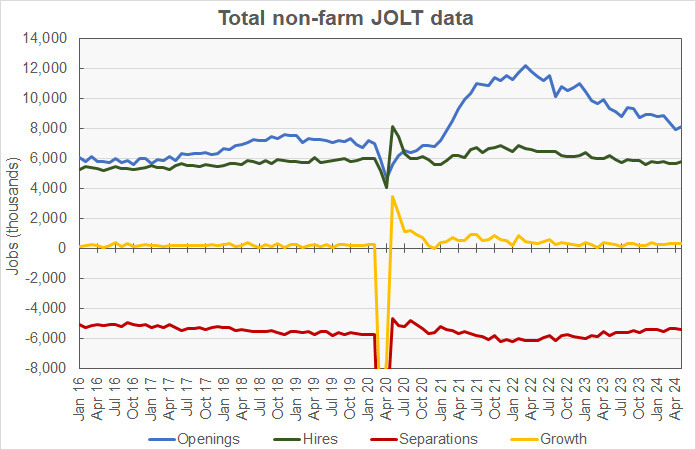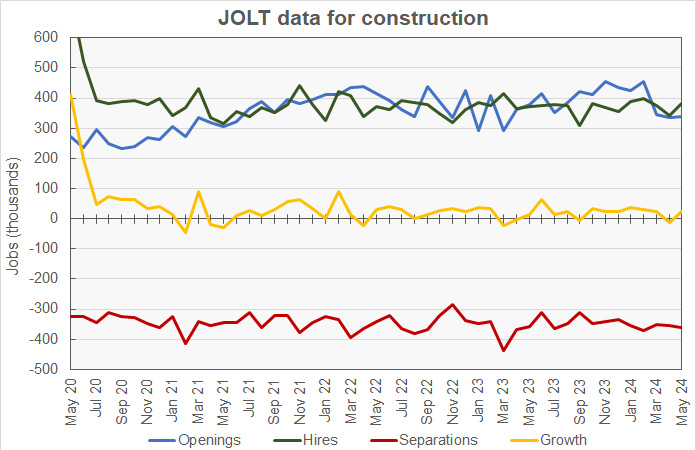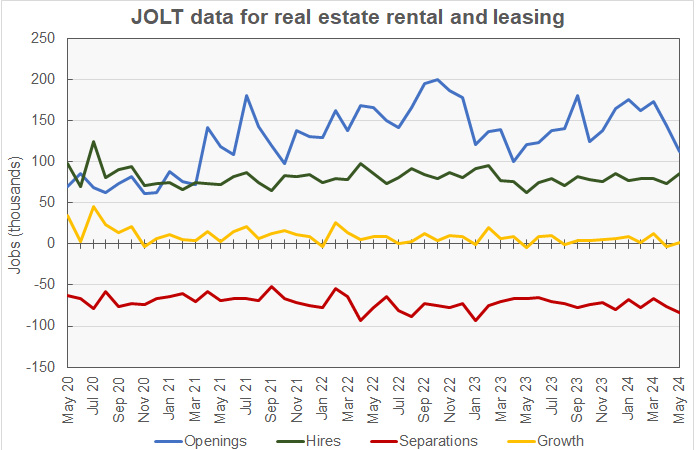The Job Openings and Labor Turnover (JOLT) report from the Bureau of Labor Statistics (BLS) said that the number of job openings in May was 8.14 million. This was reported to be up 221,000 openings month-over-month. However, the openings figure for April was revised lower by 140,000 openings, accounting for 2/3 of the reported gain. Job openings were down 1,171,000 openings from the year-ago level.
Hiring was reported to be up from last month’s revised (-25,000) figure for the economy as a whole, rising 141,000 to a level of 5.76 million hires. Total separations rose 85,000 from last month’s revised (-35,000) figure to a level of 5.42 million. Within total separations, quits were reported to rise 0.2 percent while layoffs rose 7.3 percent. Quits represented 63.8 percent of total separations for the month.
Overall job openings higher despite downward trend
For a discussion of the JOLT report and how it relates to the Employment Situation Report, please see the paragraph at the end of this article.
The May job openings figure represents 4.9 percent of total employment plus job openings. For comparison, the unemployment rate in May was reported to be 4.0 percent and 6.65 million people were unemployed. Another 5.72 million people said that they would like a job but were not counted as being in the labor force since they were not actively seeking employment.
The excess of hiring over separations in the May JOLT report implies an employment increase of 334,000 jobs for the month. Last month’s employment increase was revised to 278,000 jobs, down by 22,000 jobs from the gain initially reported last month.
Of those leaving their jobs in May, 3.46 million quit voluntarily, while 1.65 million people were involuntarily separated from their jobs. The remainder of people leaving their jobs left for other reasons, such as retirements or transfers. The portion of people quitting their jobs was up 0.1 percentage point from last month’s figure at 2.2 percent of the labor force. The involuntary separations rate was unchanged from last month’s figure at 1.0 percent.
Total non-farm JOLT data since January 2016 is shown in the first chart, below.

Construction job openings reach new normal
The next chart, below, shows the employment situation for the construction jobs market over the last 49 months. It shows that May saw a net gain of 23,000 construction jobs compared to last month’s revised loss of 14,000 jobs.

The preliminary job openings figure for May was reported to be up 2,000 openings from last month’s revised (-1,000) figure at 339,000 openings. Openings were reported to be down 10.1 percent from last year’s level and were reported to represent 4.0 percent of construction employment plus job openings.
After plunging by 110,000 job openings in March, the construction job openings figure has seemed to stabilize, varying only within a 9,000 openings range for the last 3 months.
Hiring was reported to be up by 42,000 jobs in May from the prior month’s revised (-12,000) jobs figure at 383,000 new hires. The number of construction jobs that were filled in May was reported to be up 2.7 percent year-over-year.
Construction jobs total separations were reported to rise by 5,000 jobs from the prior month’s revised (-6,000) figure to 360,000 jobs.
Quits were reported to rise by 8,000 jobs from April’s revised (-7,000) figure to a level of 199,000 jobs. Quits represented 55.3 percent of separations for the month, up by 1.5 percentage points from the revised level of last month and up nearly 10 percentage points from the trailing 6 months average.
Layoffs were reported to fall by 5,000 from April’s revised (-2,000) figure to 147,000 jobs. “Other separations” which includes retirements and transfers, were reported to be up 3,000 at 14,000 jobs.
RERL job openings in sharp decline
The last chart, below, shows the employment situation for the real estate and rental and leasing (RERL) jobs category. Employment in this jobs category was reported to be up 1,000 jobs for the month.

The number of job openings in the RERL category was reported to be 112,000 jobs at the end of May. This was down 32,000 job openings from the revised (-11,000) level of the month before. RERL job openings in May are down 33 percent over the last two month and are down 9.0 percent year-over-year. Job openings in the RERL category represent 4.3 percent of total employment plus job openings.
Hiring in May was reported to be up 12,000 jobs from April’s revised (-1,000) figure at 85,000 jobs. The hiring figure was up 37 percent from the unusually low figure of the year before.
Total separations in the RERL jobs category in May were up by 8,000 from April’s revised (+2,000) figure at 84,000 jobs.
Quits were up by 7,000 from April’s revised (+1,000) figure at 46,000 jobs. Quits represented 54.8 percent of total separations in May. Layoffs were reported to rise by 4,000 from April’s revised (+1,000) figure to 33,000 jobs.
The numbers given in the JOLT report are seasonally adjusted and are subject to revision. It is common for adjustments to be made in subsequent reports, particularly to the data for the most recent month. The full current JOLT report can be found here.
Comparing the reports
The US labor market is very dynamic with many people changing jobs in any given month. The JOLT report documents this dynamism by providing details about job openings, hiring and separations. However, it does not break down the jobs market into as fine categories as does the Employment Situation Report, which provides data on total employment and unemployment. For example, while the Employment Situation Report separates residential construction from other construction employment, the JOLT report does not. The Employment Situation Report separates residential property managers from other types of real estate and rental and leasing professionals, but the JOLT report does not. However, the JOLT report provides a look at what is driving the employment gains (or losses) in broad employment categories.












